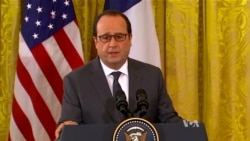Russian protesters threw eggs and stones at the Turkish Embassy in Moscow on Wednesday, a day after Turkey shot down a Russian military jet along its border with Syria.
Russia's leaders warned against visits to Turkey, which they accused of provocation and supporting terrorism.
"What can you do?" asked Russian President Vladimir Putin. "After such tragic events like the destruction of our aircraft and the death of the pilot, it's a necessary measure and the foreign minister is correct to warn our citizens about the dangers.”
But others, including Turkey, played down the incident, the first between a NATO member and Russia in decades.
"We have no intention of escalating this incident," said Turkish President Recep Tayyip Erdogan. "We are only defending our own security and the rights of our brothers."
Putin is to meet Thursday in Moscow with French President Francois Hollande to discuss cooperation in the fight against Islamic State terrorists. But analysts said Moscow's hopes that the French leader can bridge the gap between Russia and the U.S.-led coalition in Syria could be scuttled.
Meanwhile, the French parliament voted Wednesday to extend airstrikes against the Islamic State group, which claimed responsibility for the November 13 attacks that killed 130 people in Paris.
Parliament's upper house, the Senate, voted 325-0 with 21 abstentions to prolong the airstrikes in Syria beyond early January. The lower house had earlier voted 515-4 in favor.
The parliament vote came as Hollande met with German Chancellor Angela Merkel in Paris.
At a shared press conference after the meeting, Merkel promised Hollande she would act "swiftly" in the fight against terrorism and promised her complete solidarity.
"We have a shared enemy: terrorism. The Islamic State will not be convinced with words. It has to be defeated militarily," Germany's chancellor said.
The French president is meeting with world leaders in an effort to forge an international coalition to fight so-called Islamic State fighters. He has already met with British Prime Minister David Cameron, President Barack Obama and now Merkel, with each leader promising full cooperation in the fight.
That would be seen “as a very bad outcome by the Kremlin," said Pavel Felgenhauer, a Russian defense analyst and columnist, and it would make Putin "even more angry. Because he believes that the Turks did this thing, shot down the Russian plane, also to torpedo [the] possibility of forming this big coalition.”
After the attacks in Paris, Hollande offered to share anti-terrorism intelligence with Russia. But in the case of Syria, analysts said there was too much distrust and disagreement between France and Russia, because Moscow supports Syrian President Bashar al-Assad.
“Assad insists that he wants to participate [in] future elections," said Alexander Golts, an independent defense analyst and deputy editor of Russia's Yezhenedelny Zhurnal (Weekly Journal). Also, he said, it appears that the two sides have not been able to agree on "who these terrorists are [and] how to divide anti-Assad rebels from IS [Islamic State] and other terrorist organizations.”
Analysts said France could still act as a symbolic umbrella for the fight against the Islamic State. But its role would most likely be limited to helping to prevent further incidents between the two sides.





